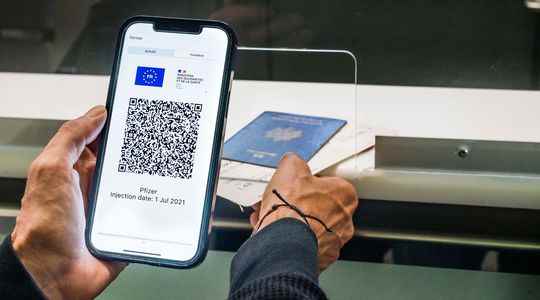The health pass does not quite say goodbye, but its successor, the vaccination pass, becomes the norm in the territory from this Monday. The publication formalizing this new government device aimed at fighting the Covid-19 epidemic, the need for which was much criticized by the opposition, fell to the Official newspaper, Sunday. Its implementation precedes the easing of restrictions (gauges, outdoor mask, teleworking, etc.), in two stages, on Wednesdays February 2 and 16.
As presented during the bill, then validated in its almost entirety by the Constitutional Council on Friday, it will be necessary to be able to justify for those over 16 years of age a vaccination status to access leisure activities, restaurants and bars, fairs or public transport interregional. A negative test will no longer suffice, except to access health facilities and services. A handful of specificities exist, in particular to encourage first-time recipients to complete their vaccination schedule. Update on all the questions you have about the vaccination pass.
- Under what conditions is my vaccination pass valid?
There is three.
- On presentation of a complete vaccination certificate (one or two doses depending on the vaccine) with a booster dose for those who are eligible (those over 18 within a given time: 7 months after the second dose, 4 months from of February 15).
- Or a certificate of recovery of more than 11 days and less than six months (regardless of their vaccination status).
- Or a certificate of contraindication to vaccination, issued by a doctor, on specific criteria, some temporary.
A small exception exists, for those who have so far received only one dose and who have not contracted Covid less than six months ago: their pass can be validated provided that the second dose is taken within the next month. The validity of the pass remains conditional on passing a negative PCR test within 24 hours.
In all places where the health pass was previously requested: leisure activities, restaurants and drinking establishments (with the exception of collective catering), fairs, seminars and trade shows, as well as in public transport interregional (planes, trains, coaches). In the case of transport, an exemption is provided for in the event of “compelling family or health reasons” – a dying relative for example – subject to presenting a negative test (except in an emergency).
The health pass remains valid for access to health establishments and medico-social services, whether for the sick or their companions (except emergency care). And this, for children over 12 years old.
Political meetings are currently neither subject to the vaccination pass nor the health pass.
- Is it also compulsory at work?
“Just like the health pass, the vaccination pass will apply for the public as well as for people who work in places where it is compulsory”, indicates the government. In other words, if you work in a company that does not currently ask for the health pass, it will not ask you for the vaccination pass either from this Monday.
- From what age are we concerned?
The pass is accessible from the age of 16. In this age group, only 16-17 year olds are exempt from the booster dose. Minors aged 12 to 15 will remain subject to the obligation to present the current health pass (negative Covid test, certificate of complete vaccination or certificate of recovery).
Children under 12 are not affected.
- Should I initiate a process to transform his past?
For people whose vaccination schedule is complete, the health pass will be automatically converted into a vaccination pass, no specific procedure is required.
- Will certain places be able to request a vaccination pass and a negative PCR test?
This is indeed provided for by law. On the other hand, no example appears for the moment in the implementing decree published in the Official Journal on Sunday.
The Constitutional Council has already ruled out its hypothetical application for interregional public transport (buses, planes, trains).
- Who will control the pass?
In addition to the police, the managers of places and activities subject to the pass, such as cafeterias and restaurateurs, will be able to verify the identity of the bearer of the pass by asking him for “an official document” containing a photograph. This point, disputed by the opposition during the debates around the bill, nevertheless received the green light from the Constitutional Council. “The refusal of the person to produce such a document can have no other consequence than the impossibility for him to access this place”, indicated the Elders.
- What are the penalties for fraud?
The fact of presenting a pass belonging to another person and the fact of transmitting a pass to another person with a view to its fraudulent use will be punished on the first breach by a fixed fine of 1000 euros, against 135 euros currently. Under the condition of engaging in a vaccination course, there may not be a sanction for a false pass.
The lack of control of the managers of places subject to the pass is also sanctioned with a fine of 1000 euros, also from the first breach noted.
“The fraudulent possession of one of the false documents mentioned in this paragraph is punishable by three years’ imprisonment and a fine of 45,000 euros. The penalty is increased to five years’ imprisonment and a fine of 75,000 euros in the event of fraudulent possession of several false documents”, finally specifies the law published in the Official Journal.
